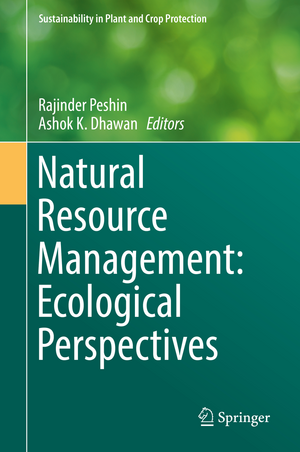Natural Resource Management: Ecological Perspectives: Sustainability in Plant and Crop Protection
Editat de Rajinder Peshin, Ashok K. Dhawanen Limba Engleză Hardback – 29 mar 2019
Din seria Sustainability in Plant and Crop Protection
- 18%
 Preț: 1244.08 lei
Preț: 1244.08 lei - 24%
 Preț: 794.96 lei
Preț: 794.96 lei - 18%
 Preț: 1126.59 lei
Preț: 1126.59 lei - 24%
 Preț: 781.64 lei
Preț: 781.64 lei - 18%
 Preț: 1107.56 lei
Preț: 1107.56 lei - 24%
 Preț: 818.76 lei
Preț: 818.76 lei - 24%
 Preț: 810.45 lei
Preț: 810.45 lei - 24%
 Preț: 1053.51 lei
Preț: 1053.51 lei - 24%
 Preț: 792.90 lei
Preț: 792.90 lei - 20%
 Preț: 558.51 lei
Preț: 558.51 lei - 23%
 Preț: 579.82 lei
Preț: 579.82 lei - 24%
 Preț: 835.82 lei
Preț: 835.82 lei - 18%
 Preț: 944.67 lei
Preț: 944.67 lei - 18%
 Preț: 1380.98 lei
Preț: 1380.98 lei - 18%
 Preț: 951.91 lei
Preț: 951.91 lei - 18%
 Preț: 1229.28 lei
Preț: 1229.28 lei
Preț: 648.24 lei
Preț vechi: 762.64 lei
-15% Nou
Puncte Express: 972
Preț estimativ în valută:
124.04€ • 129.86$ • 102.64£
124.04€ • 129.86$ • 102.64£
Carte disponibilă
Livrare economică 15-29 martie
Preluare comenzi: 021 569.72.76
Specificații
ISBN-13: 9783319997674
ISBN-10: 331999767X
Pagini: 300
Ilustrații: XXIV, 276 p. 48 illus., 22 illus. in color.
Dimensiuni: 155 x 235 mm
Greutate: 0.64 kg
Ediția:1st ed. 2019
Editura: Springer International Publishing
Colecția Springer
Seria Sustainability in Plant and Crop Protection
Locul publicării:Cham, Switzerland
ISBN-10: 331999767X
Pagini: 300
Ilustrații: XXIV, 276 p. 48 illus., 22 illus. in color.
Dimensiuni: 155 x 235 mm
Greutate: 0.64 kg
Ediția:1st ed. 2019
Editura: Springer International Publishing
Colecția Springer
Seria Sustainability in Plant and Crop Protection
Locul publicării:Cham, Switzerland
Cuprins
1. Managing Wetland Ecosystems: A Polycentric Perspective.- 2. Sustainability of Groundwater Use in Punjab Agriculture: Issues and Options.- 3. Sustainability of HimalayanEnvironment:Issues and Policies.- 4. Crop Genetic Biodiversity with special reference to oilseed Brassicas and wild allies-conservation and their utilization.- 5. Integrated Farming System: Enhancement Income Source for Marginal and Small Farmers.- 6. Health Effects of Changing Environment.- 7. An Approach to Cancer Risk Assessment and Carcinogenic Potential for Three Classes of Agricultural Pesticide.- 8. Climate change: Impact on biotic stresses afflicting crop plants.- 9. Role of Microbes in Sustainable Agriculture.- 10. Exploiting Chemical Ecology for Developing Novel Integrated Pest Management Strategies for Africa.- 11. Insect Resistance to Insecticides and Bt-cotton in India.- 12. Ecological Pest Management in 21st Century: An Analysis of Challenges and Future Strategies.- 13. Understanding the diversity inlac insects of Kerria spp. in India and the nature of insect-host plant interaction.- 14. Diffusion and Adoption: Factors Impacting Adoption of Sustainable Agricultural Practices.
Notă biografică
Rajinder Peshin is professor at the Sher-e-Kashmir University of Agricultural Sciences and Technology of Jammu (SKUAST Jammu), India. He received his Master of Science in extension education and PhD degrees from the Punjab Agricultural University, Ludhiana, India. He worked as agriculture extension officer in the Department of Agriculture, Government of Jammu & Kashmir, from 1989 to 1998 before joining SKUAST Jammu in 1998 as an assistant professor. His research expertise is dissemination and evaluation of issues associated with sustainable agriculture research and development programmes, especially for integrated pest management. He developed a model for predicting the adoptability of agricultural technologies when put on trial at farmers' fields, and an evaluation methodology for integrated pest management programmes. Dr Peshin published 63 scientific papers and chapters of books, and authored seven books. These include four books on integrated pest managementseries published by Springer in 2009 and 2014.
Ashok K. Dhawan is former additional director and head Department of Entomology, Punjab Agricultural University (PAU), Ludhiana, India. At present he is the President of the Indian Ecological Society. He worked for more than 37 years on integrated pest management (IPM) in cotton. He was instrumental in devising and implementing insecticides resistant management strategy, mealy bug management in cotton, and transfer of technology for management of cotton pests in more than 800 villages. He developed IPM models for rice, maize and vegetables pests and implemented these at village level. He has authored 16 books, 430 research papers and 80 extension publications. He is a member of executive council of various scientific bodies, member of advisory of various government and private sector organizations. He was awarded the Best Team Award by the Indian Council of Agricultural Research (ICAR) and Department for International Development (DIFD-UK) for transfer of technology.
Textul de pe ultima copertă
This book is an outcome of the keynote/lead papers presented by the experts from different disciplines in the Indian Ecological Society International Conference 2016 on “Natural Resource Management: Ecological Perspectives”, organized at the Sher-e-Kashmir University of Agricultural Sciences and Technology of Jammu, India. The book captures the essence of natural resource management from the intra and interdisciplinary perspectives of agricultural sciences (entomology, plant pathology, plant breeding and genetics, agronomy and soil sciences), social sciences (resource economics, agricultural extension education), medical sciences, and environmental sciences to stimulate discussion on the ecological perspectives of natural resource management. Wide-ranging topics on land and water resources, biodiversity, integrated farming system, role of microbes in agriculture, climate change and its impact on human health and crop pests, exploiting chemical ecology for pest management, human disease-causing pesticides, beneficial insects like lac insects, integrated pest management, resistance management in insect pests and Bt cotton , and diffusion and adoption of ecologically sustainable technologies at individual and organizational level are covered in the book.. The book will serve the professionals, researchers, academia, government, industry and students.
Caracteristici
Intra and interdisciplinary reference book Ecological perspectives on biophysical, biological and social aspects of natural resources Climate change impacts on human health and agriculture
